Human Resource Management Report: Analysis of Unilever UK
VerifiedAdded on 2020/02/03
|16
|4840
|349
Report
AI Summary
This report provides a comprehensive analysis of human resource management (HRM) practices at Unilever, UK. It begins by introducing the importance of HRM in achieving organizational goals, specifically focusing on the application of David Guest's model, which includes HRM strategies, practices, outcomes, behavior outcomes, performance outcomes, and financial outcomes. The report then contrasts John Storey's HRM model with personnel management, emphasizing the strategic approach to managing resources and employee development within Unilever. It highlights the roles of line managers and employees in strategic development and the importance of employee performance and engagement. Furthermore, the report delves into the implementation of flexible working models at Unilever, examining various types of flexibility such as functional, flexible work arrangements, spatial, location, and numerical flexibility. The report discusses the positive impacts of flexible working on employee relations, family life, and overall productivity, while also addressing the changing dynamics in the labor market and the shift towards the service sector. The conclusion emphasizes the adoption of flexible working hours to enhance employee satisfaction and gain a competitive advantage in the market.
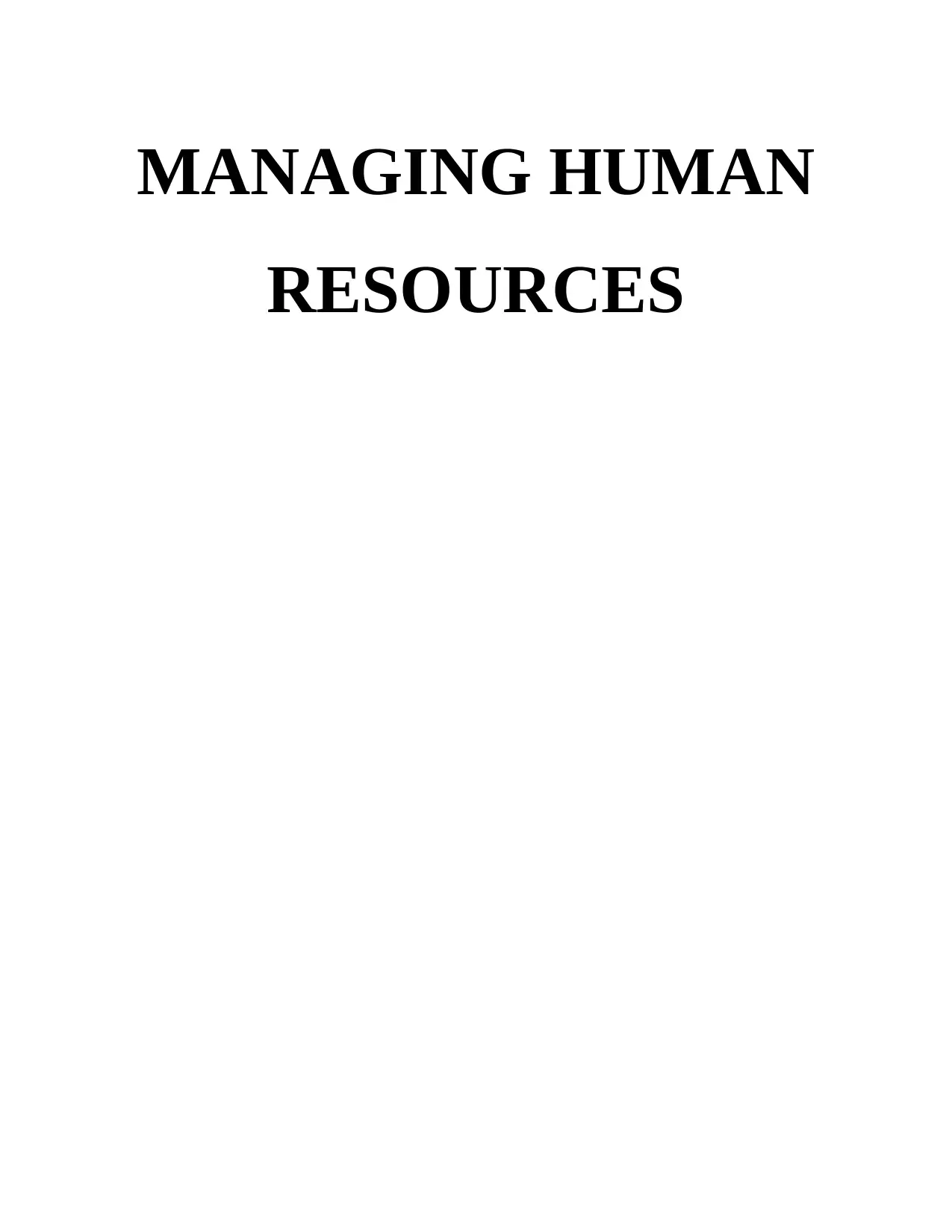
MANAGING HUMAN
RESOURCES
RESOURCES
Paraphrase This Document
Need a fresh take? Get an instant paraphrase of this document with our AI Paraphraser
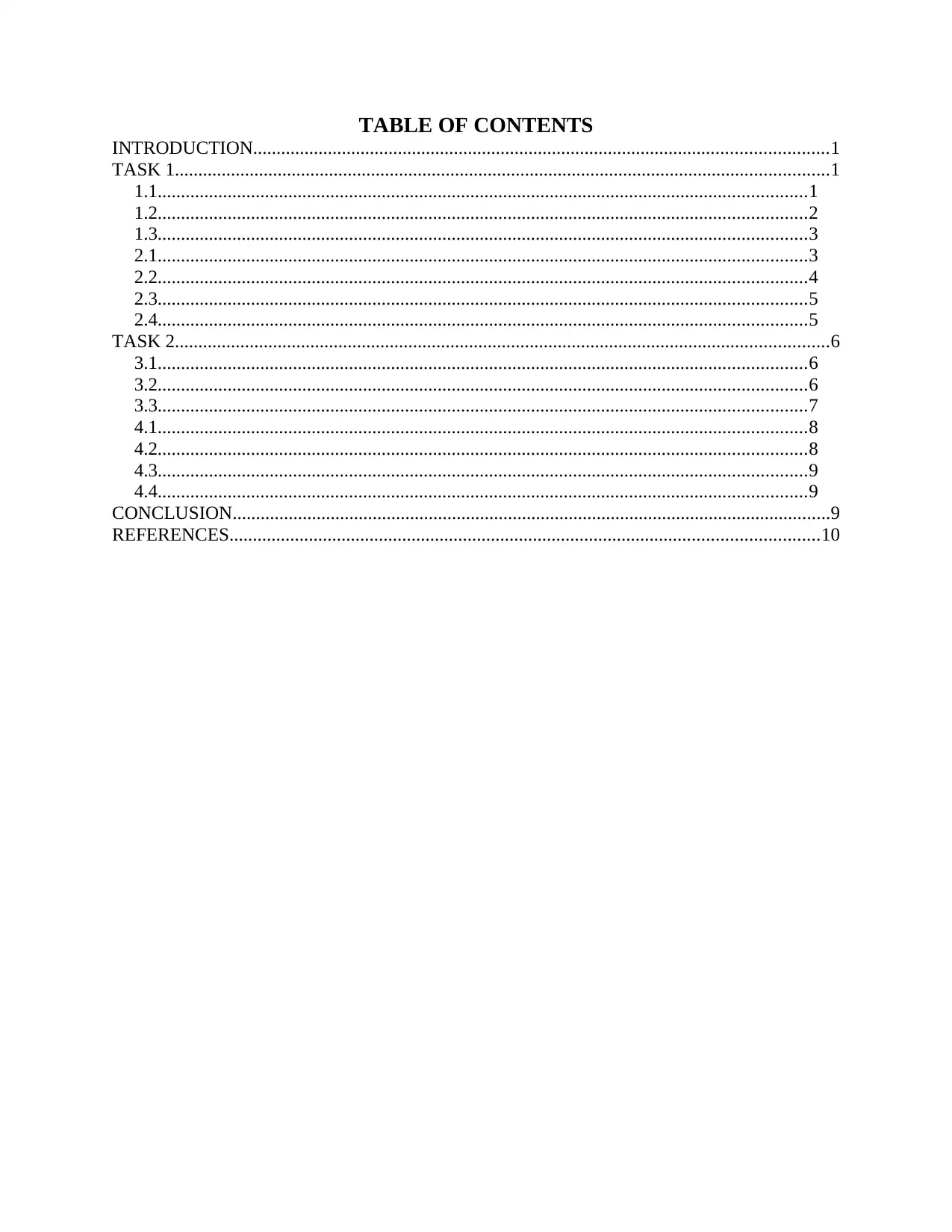
TABLE OF CONTENTS
INTRODUCTION...........................................................................................................................1
TASK 1............................................................................................................................................1
1.1...........................................................................................................................................1
1.2...........................................................................................................................................2
1.3...........................................................................................................................................3
2.1...........................................................................................................................................3
2.2...........................................................................................................................................4
2.3...........................................................................................................................................5
2.4...........................................................................................................................................5
TASK 2............................................................................................................................................6
3.1...........................................................................................................................................6
3.2...........................................................................................................................................6
3.3...........................................................................................................................................7
4.1...........................................................................................................................................8
4.2...........................................................................................................................................8
4.3...........................................................................................................................................9
4.4...........................................................................................................................................9
CONCLUSION................................................................................................................................9
REFERENCES..............................................................................................................................10
INTRODUCTION...........................................................................................................................1
TASK 1............................................................................................................................................1
1.1...........................................................................................................................................1
1.2...........................................................................................................................................2
1.3...........................................................................................................................................3
2.1...........................................................................................................................................3
2.2...........................................................................................................................................4
2.3...........................................................................................................................................5
2.4...........................................................................................................................................5
TASK 2............................................................................................................................................6
3.1...........................................................................................................................................6
3.2...........................................................................................................................................6
3.3...........................................................................................................................................7
4.1...........................................................................................................................................8
4.2...........................................................................................................................................8
4.3...........................................................................................................................................9
4.4...........................................................................................................................................9
CONCLUSION................................................................................................................................9
REFERENCES..............................................................................................................................10
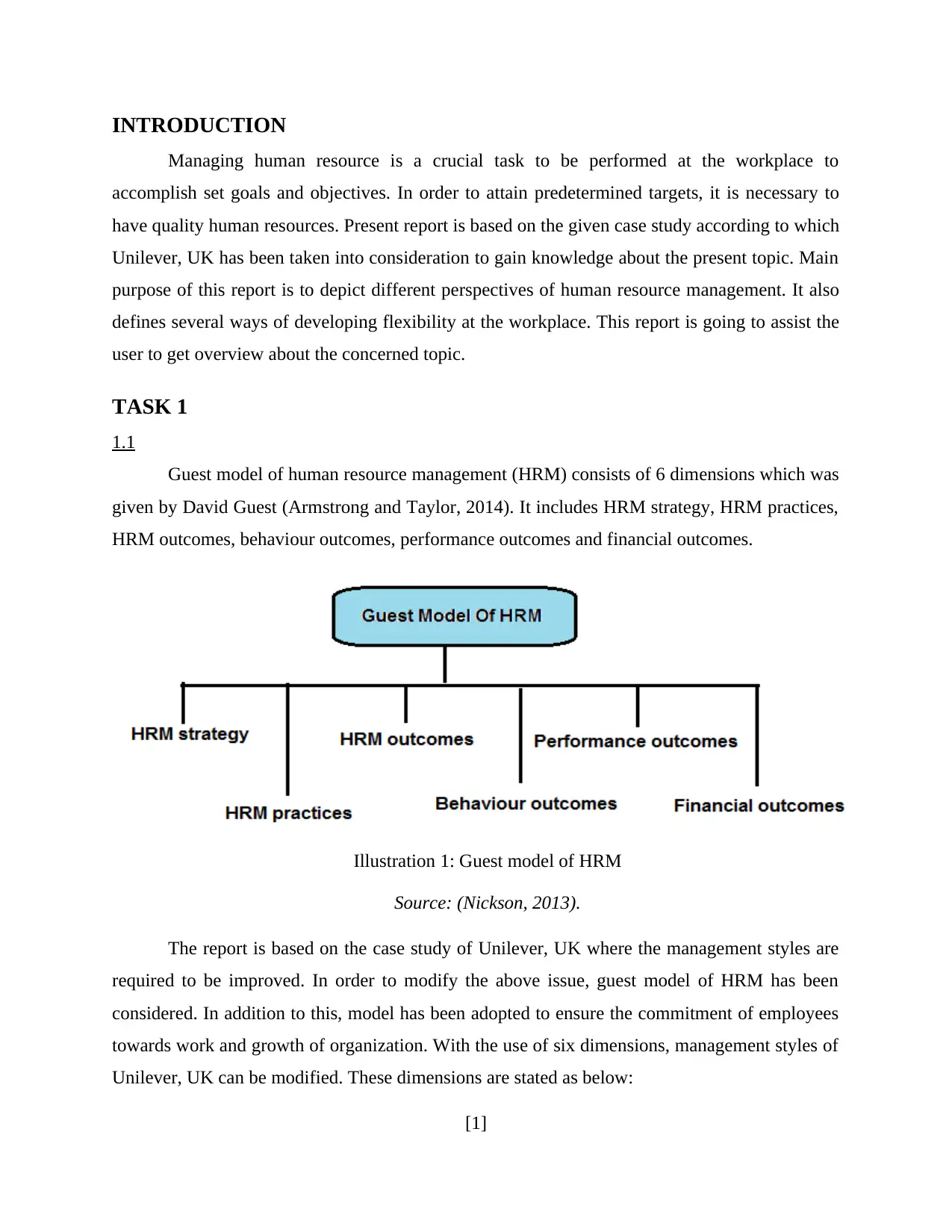
INTRODUCTION
Managing human resource is a crucial task to be performed at the workplace to
accomplish set goals and objectives. In order to attain predetermined targets, it is necessary to
have quality human resources. Present report is based on the given case study according to which
Unilever, UK has been taken into consideration to gain knowledge about the present topic. Main
purpose of this report is to depict different perspectives of human resource management. It also
defines several ways of developing flexibility at the workplace. This report is going to assist the
user to get overview about the concerned topic.
TASK 1
1.1
Guest model of human resource management (HRM) consists of 6 dimensions which was
given by David Guest (Armstrong and Taylor, 2014). It includes HRM strategy, HRM practices,
HRM outcomes, behaviour outcomes, performance outcomes and financial outcomes.
The report is based on the case study of Unilever, UK where the management styles are
required to be improved. In order to modify the above issue, guest model of HRM has been
considered. In addition to this, model has been adopted to ensure the commitment of employees
towards work and growth of organization. With the use of six dimensions, management styles of
Unilever, UK can be modified. These dimensions are stated as below:
[1]
Illustration 1: Guest model of HRM
Source: (Nickson, 2013).
Managing human resource is a crucial task to be performed at the workplace to
accomplish set goals and objectives. In order to attain predetermined targets, it is necessary to
have quality human resources. Present report is based on the given case study according to which
Unilever, UK has been taken into consideration to gain knowledge about the present topic. Main
purpose of this report is to depict different perspectives of human resource management. It also
defines several ways of developing flexibility at the workplace. This report is going to assist the
user to get overview about the concerned topic.
TASK 1
1.1
Guest model of human resource management (HRM) consists of 6 dimensions which was
given by David Guest (Armstrong and Taylor, 2014). It includes HRM strategy, HRM practices,
HRM outcomes, behaviour outcomes, performance outcomes and financial outcomes.
The report is based on the case study of Unilever, UK where the management styles are
required to be improved. In order to modify the above issue, guest model of HRM has been
considered. In addition to this, model has been adopted to ensure the commitment of employees
towards work and growth of organization. With the use of six dimensions, management styles of
Unilever, UK can be modified. These dimensions are stated as below:
[1]
Illustration 1: Guest model of HRM
Source: (Nickson, 2013).
⊘ This is a preview!⊘
Do you want full access?
Subscribe today to unlock all pages.

Trusted by 1+ million students worldwide
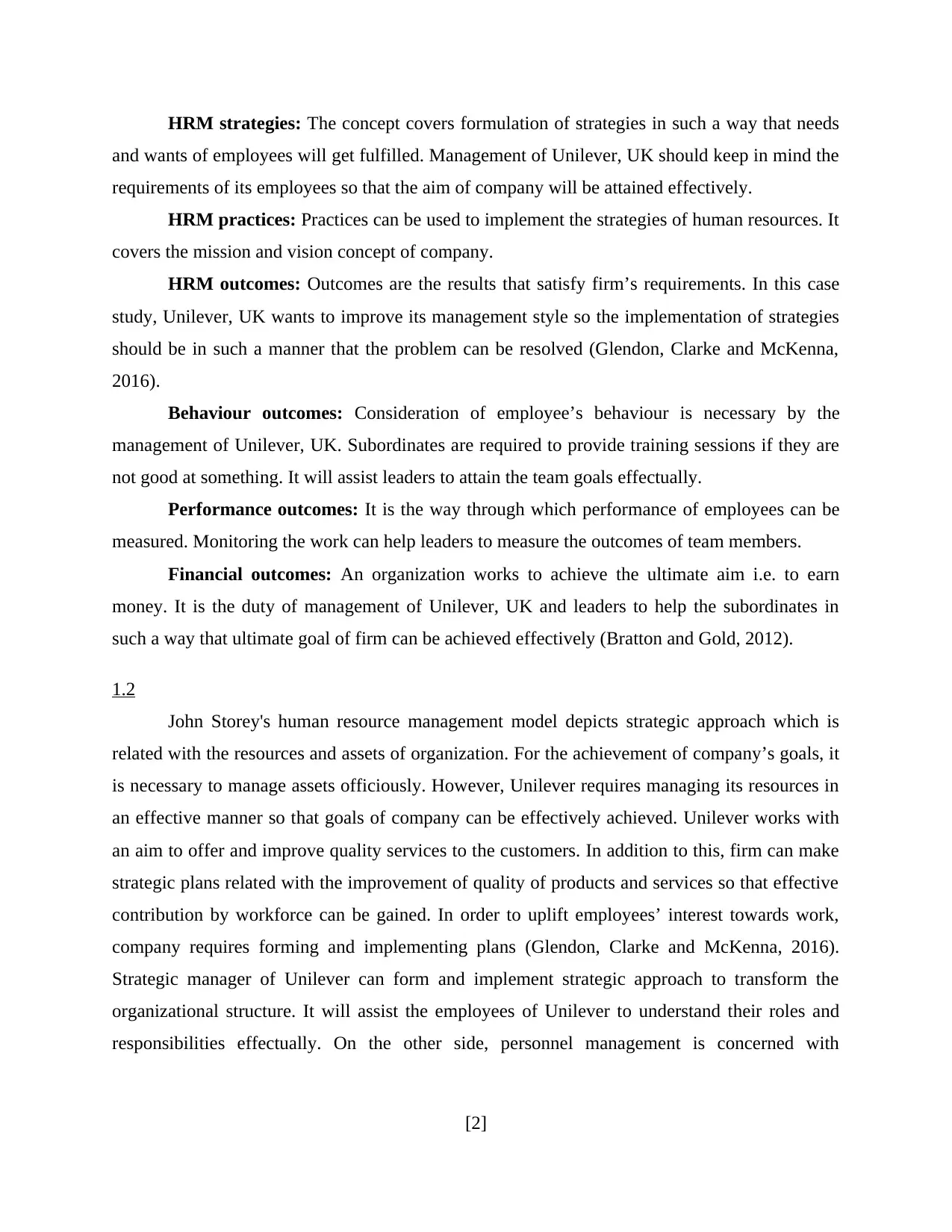
HRM strategies: The concept covers formulation of strategies in such a way that needs
and wants of employees will get fulfilled. Management of Unilever, UK should keep in mind the
requirements of its employees so that the aim of company will be attained effectively.
HRM practices: Practices can be used to implement the strategies of human resources. It
covers the mission and vision concept of company.
HRM outcomes: Outcomes are the results that satisfy firm’s requirements. In this case
study, Unilever, UK wants to improve its management style so the implementation of strategies
should be in such a manner that the problem can be resolved (Glendon, Clarke and McKenna,
2016).
Behaviour outcomes: Consideration of employee’s behaviour is necessary by the
management of Unilever, UK. Subordinates are required to provide training sessions if they are
not good at something. It will assist leaders to attain the team goals effectually.
Performance outcomes: It is the way through which performance of employees can be
measured. Monitoring the work can help leaders to measure the outcomes of team members.
Financial outcomes: An organization works to achieve the ultimate aim i.e. to earn
money. It is the duty of management of Unilever, UK and leaders to help the subordinates in
such a way that ultimate goal of firm can be achieved effectively (Bratton and Gold, 2012).
1.2
John Storey's human resource management model depicts strategic approach which is
related with the resources and assets of organization. For the achievement of company’s goals, it
is necessary to manage assets officiously. However, Unilever requires managing its resources in
an effective manner so that goals of company can be effectively achieved. Unilever works with
an aim to offer and improve quality services to the customers. In addition to this, firm can make
strategic plans related with the improvement of quality of products and services so that effective
contribution by workforce can be gained. In order to uplift employees’ interest towards work,
company requires forming and implementing plans (Glendon, Clarke and McKenna, 2016).
Strategic manager of Unilever can form and implement strategic approach to transform the
organizational structure. It will assist the employees of Unilever to understand their roles and
responsibilities effectually. On the other side, personnel management is concerned with
[2]
and wants of employees will get fulfilled. Management of Unilever, UK should keep in mind the
requirements of its employees so that the aim of company will be attained effectively.
HRM practices: Practices can be used to implement the strategies of human resources. It
covers the mission and vision concept of company.
HRM outcomes: Outcomes are the results that satisfy firm’s requirements. In this case
study, Unilever, UK wants to improve its management style so the implementation of strategies
should be in such a manner that the problem can be resolved (Glendon, Clarke and McKenna,
2016).
Behaviour outcomes: Consideration of employee’s behaviour is necessary by the
management of Unilever, UK. Subordinates are required to provide training sessions if they are
not good at something. It will assist leaders to attain the team goals effectually.
Performance outcomes: It is the way through which performance of employees can be
measured. Monitoring the work can help leaders to measure the outcomes of team members.
Financial outcomes: An organization works to achieve the ultimate aim i.e. to earn
money. It is the duty of management of Unilever, UK and leaders to help the subordinates in
such a way that ultimate goal of firm can be achieved effectively (Bratton and Gold, 2012).
1.2
John Storey's human resource management model depicts strategic approach which is
related with the resources and assets of organization. For the achievement of company’s goals, it
is necessary to manage assets officiously. However, Unilever requires managing its resources in
an effective manner so that goals of company can be effectively achieved. Unilever works with
an aim to offer and improve quality services to the customers. In addition to this, firm can make
strategic plans related with the improvement of quality of products and services so that effective
contribution by workforce can be gained. In order to uplift employees’ interest towards work,
company requires forming and implementing plans (Glendon, Clarke and McKenna, 2016).
Strategic manager of Unilever can form and implement strategic approach to transform the
organizational structure. It will assist the employees of Unilever to understand their roles and
responsibilities effectually. On the other side, personnel management is concerned with
[2]
Paraphrase This Document
Need a fresh take? Get an instant paraphrase of this document with our AI Paraphraser
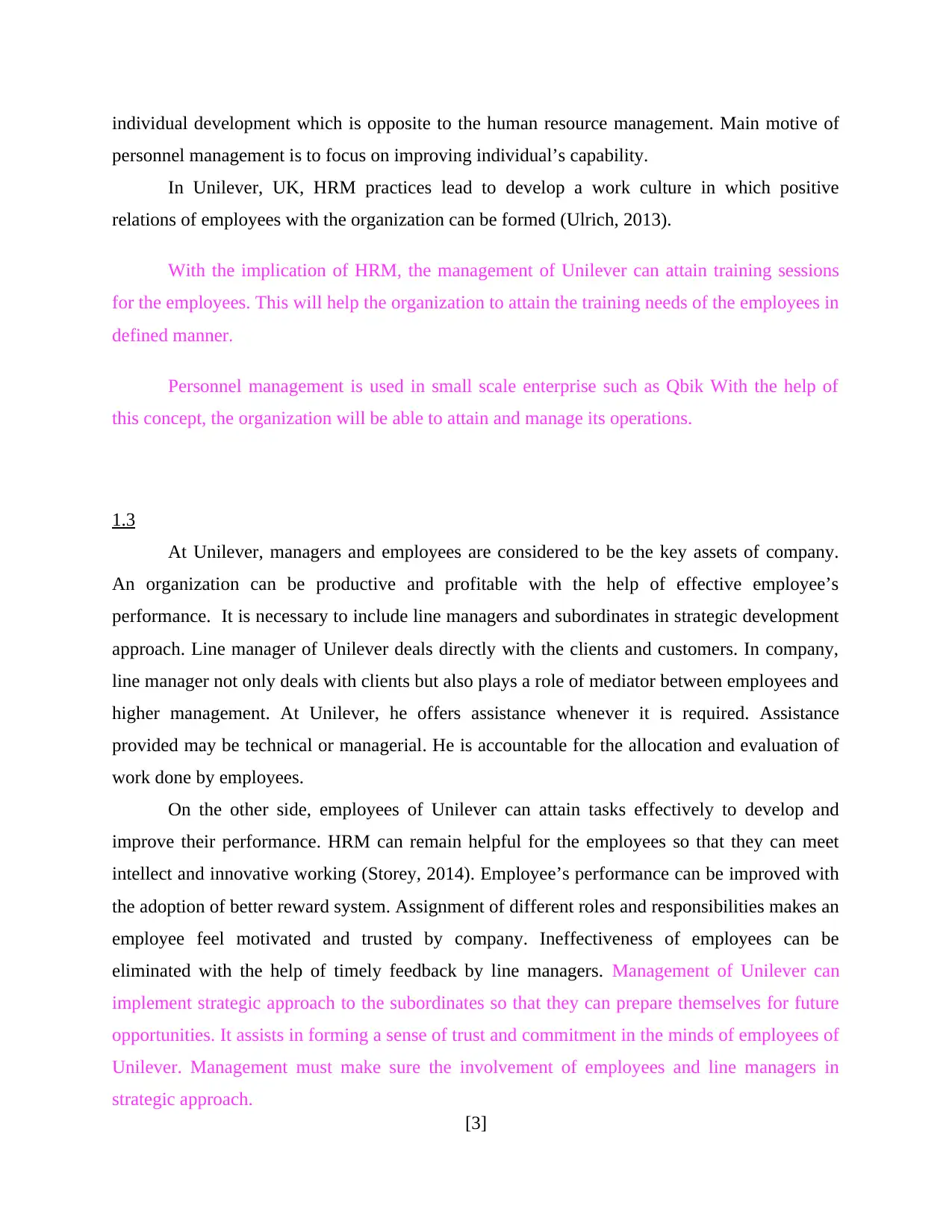
individual development which is opposite to the human resource management. Main motive of
personnel management is to focus on improving individual’s capability.
In Unilever, UK, HRM practices lead to develop a work culture in which positive
relations of employees with the organization can be formed (Ulrich, 2013).
With the implication of HRM, the management of Unilever can attain training sessions
for the employees. This will help the organization to attain the training needs of the employees in
defined manner.
Personnel management is used in small scale enterprise such as Qbik With the help of
this concept, the organization will be able to attain and manage its operations.
1.3
At Unilever, managers and employees are considered to be the key assets of company.
An organization can be productive and profitable with the help of effective employee’s
performance. It is necessary to include line managers and subordinates in strategic development
approach. Line manager of Unilever deals directly with the clients and customers. In company,
line manager not only deals with clients but also plays a role of mediator between employees and
higher management. At Unilever, he offers assistance whenever it is required. Assistance
provided may be technical or managerial. He is accountable for the allocation and evaluation of
work done by employees.
On the other side, employees of Unilever can attain tasks effectively to develop and
improve their performance. HRM can remain helpful for the employees so that they can meet
intellect and innovative working (Storey, 2014). Employee’s performance can be improved with
the adoption of better reward system. Assignment of different roles and responsibilities makes an
employee feel motivated and trusted by company. Ineffectiveness of employees can be
eliminated with the help of timely feedback by line managers. Management of Unilever can
implement strategic approach to the subordinates so that they can prepare themselves for future
opportunities. It assists in forming a sense of trust and commitment in the minds of employees of
Unilever. Management must make sure the involvement of employees and line managers in
strategic approach.
[3]
personnel management is to focus on improving individual’s capability.
In Unilever, UK, HRM practices lead to develop a work culture in which positive
relations of employees with the organization can be formed (Ulrich, 2013).
With the implication of HRM, the management of Unilever can attain training sessions
for the employees. This will help the organization to attain the training needs of the employees in
defined manner.
Personnel management is used in small scale enterprise such as Qbik With the help of
this concept, the organization will be able to attain and manage its operations.
1.3
At Unilever, managers and employees are considered to be the key assets of company.
An organization can be productive and profitable with the help of effective employee’s
performance. It is necessary to include line managers and subordinates in strategic development
approach. Line manager of Unilever deals directly with the clients and customers. In company,
line manager not only deals with clients but also plays a role of mediator between employees and
higher management. At Unilever, he offers assistance whenever it is required. Assistance
provided may be technical or managerial. He is accountable for the allocation and evaluation of
work done by employees.
On the other side, employees of Unilever can attain tasks effectively to develop and
improve their performance. HRM can remain helpful for the employees so that they can meet
intellect and innovative working (Storey, 2014). Employee’s performance can be improved with
the adoption of better reward system. Assignment of different roles and responsibilities makes an
employee feel motivated and trusted by company. Ineffectiveness of employees can be
eliminated with the help of timely feedback by line managers. Management of Unilever can
implement strategic approach to the subordinates so that they can prepare themselves for future
opportunities. It assists in forming a sense of trust and commitment in the minds of employees of
Unilever. Management must make sure the involvement of employees and line managers in
strategic approach.
[3]
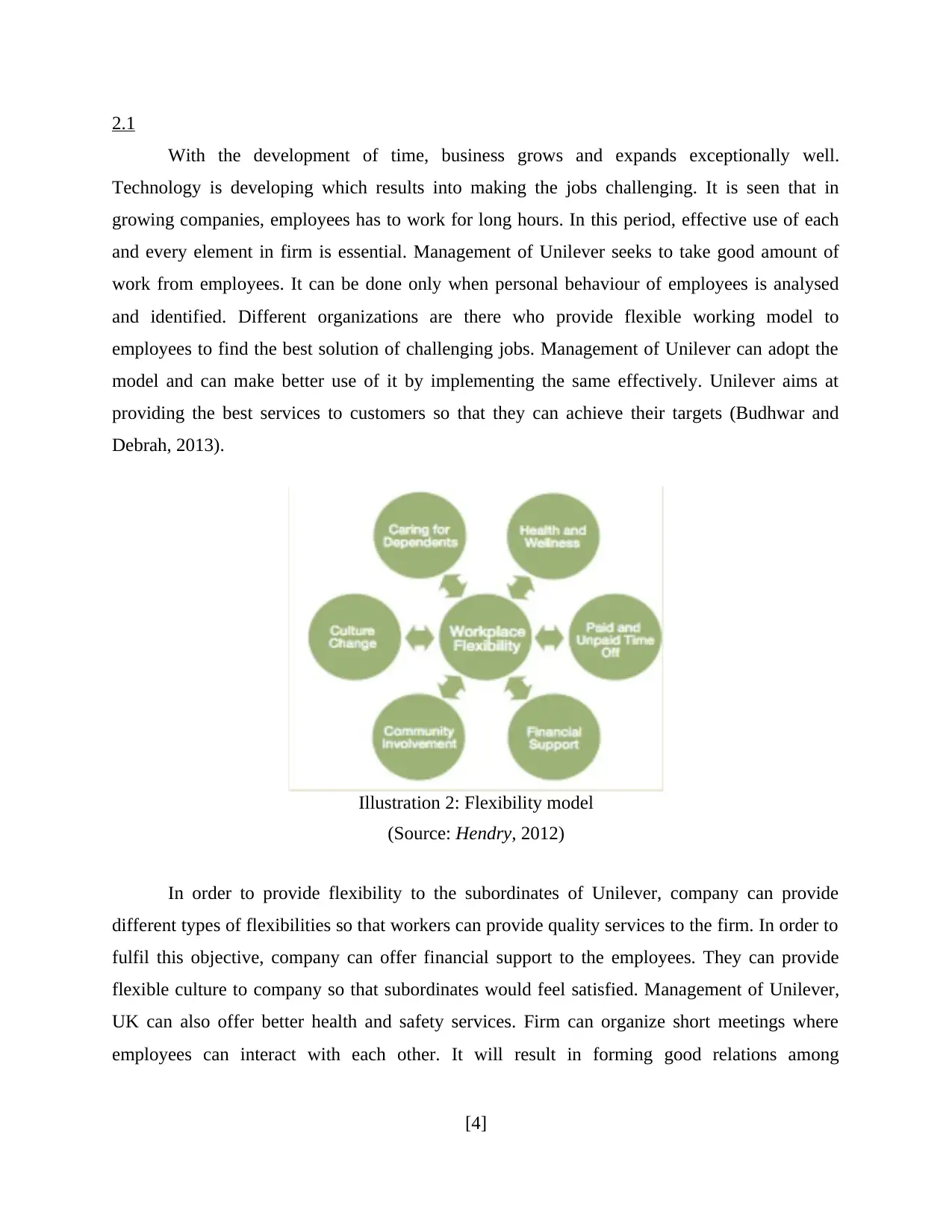
2.1
With the development of time, business grows and expands exceptionally well.
Technology is developing which results into making the jobs challenging. It is seen that in
growing companies, employees has to work for long hours. In this period, effective use of each
and every element in firm is essential. Management of Unilever seeks to take good amount of
work from employees. It can be done only when personal behaviour of employees is analysed
and identified. Different organizations are there who provide flexible working model to
employees to find the best solution of challenging jobs. Management of Unilever can adopt the
model and can make better use of it by implementing the same effectively. Unilever aims at
providing the best services to customers so that they can achieve their targets (Budhwar and
Debrah, 2013).
In order to provide flexibility to the subordinates of Unilever, company can provide
different types of flexibilities so that workers can provide quality services to the firm. In order to
fulfil this objective, company can offer financial support to the employees. They can provide
flexible culture to company so that subordinates would feel satisfied. Management of Unilever,
UK can also offer better health and safety services. Firm can organize short meetings where
employees can interact with each other. It will result in forming good relations among
[4]
Illustration 2: Flexibility model
(Source: Hendry, 2012)
With the development of time, business grows and expands exceptionally well.
Technology is developing which results into making the jobs challenging. It is seen that in
growing companies, employees has to work for long hours. In this period, effective use of each
and every element in firm is essential. Management of Unilever seeks to take good amount of
work from employees. It can be done only when personal behaviour of employees is analysed
and identified. Different organizations are there who provide flexible working model to
employees to find the best solution of challenging jobs. Management of Unilever can adopt the
model and can make better use of it by implementing the same effectively. Unilever aims at
providing the best services to customers so that they can achieve their targets (Budhwar and
Debrah, 2013).
In order to provide flexibility to the subordinates of Unilever, company can provide
different types of flexibilities so that workers can provide quality services to the firm. In order to
fulfil this objective, company can offer financial support to the employees. They can provide
flexible culture to company so that subordinates would feel satisfied. Management of Unilever,
UK can also offer better health and safety services. Firm can organize short meetings where
employees can interact with each other. It will result in forming good relations among
[4]
Illustration 2: Flexibility model
(Source: Hendry, 2012)
⊘ This is a preview!⊘
Do you want full access?
Subscribe today to unlock all pages.

Trusted by 1+ million students worldwide
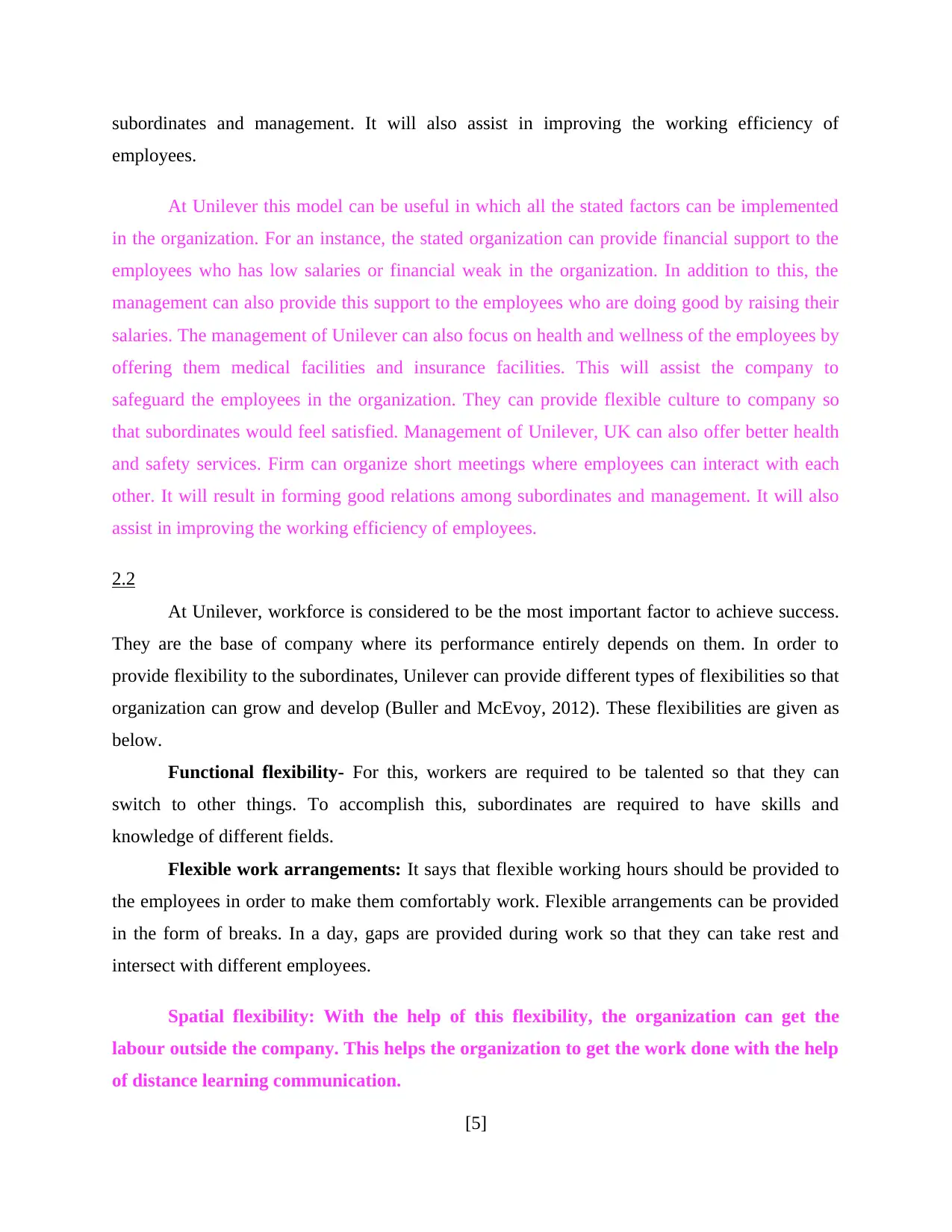
subordinates and management. It will also assist in improving the working efficiency of
employees.
At Unilever this model can be useful in which all the stated factors can be implemented
in the organization. For an instance, the stated organization can provide financial support to the
employees who has low salaries or financial weak in the organization. In addition to this, the
management can also provide this support to the employees who are doing good by raising their
salaries. The management of Unilever can also focus on health and wellness of the employees by
offering them medical facilities and insurance facilities. This will assist the company to
safeguard the employees in the organization. They can provide flexible culture to company so
that subordinates would feel satisfied. Management of Unilever, UK can also offer better health
and safety services. Firm can organize short meetings where employees can interact with each
other. It will result in forming good relations among subordinates and management. It will also
assist in improving the working efficiency of employees.
2.2
At Unilever, workforce is considered to be the most important factor to achieve success.
They are the base of company where its performance entirely depends on them. In order to
provide flexibility to the subordinates, Unilever can provide different types of flexibilities so that
organization can grow and develop (Buller and McEvoy, 2012). These flexibilities are given as
below.
Functional flexibility- For this, workers are required to be talented so that they can
switch to other things. To accomplish this, subordinates are required to have skills and
knowledge of different fields.
Flexible work arrangements: It says that flexible working hours should be provided to
the employees in order to make them comfortably work. Flexible arrangements can be provided
in the form of breaks. In a day, gaps are provided during work so that they can take rest and
intersect with different employees.
Spatial flexibility: With the help of this flexibility, the organization can get the
labour outside the company. This helps the organization to get the work done with the help
of distance learning communication.
[5]
employees.
At Unilever this model can be useful in which all the stated factors can be implemented
in the organization. For an instance, the stated organization can provide financial support to the
employees who has low salaries or financial weak in the organization. In addition to this, the
management can also provide this support to the employees who are doing good by raising their
salaries. The management of Unilever can also focus on health and wellness of the employees by
offering them medical facilities and insurance facilities. This will assist the company to
safeguard the employees in the organization. They can provide flexible culture to company so
that subordinates would feel satisfied. Management of Unilever, UK can also offer better health
and safety services. Firm can organize short meetings where employees can interact with each
other. It will result in forming good relations among subordinates and management. It will also
assist in improving the working efficiency of employees.
2.2
At Unilever, workforce is considered to be the most important factor to achieve success.
They are the base of company where its performance entirely depends on them. In order to
provide flexibility to the subordinates, Unilever can provide different types of flexibilities so that
organization can grow and develop (Buller and McEvoy, 2012). These flexibilities are given as
below.
Functional flexibility- For this, workers are required to be talented so that they can
switch to other things. To accomplish this, subordinates are required to have skills and
knowledge of different fields.
Flexible work arrangements: It says that flexible working hours should be provided to
the employees in order to make them comfortably work. Flexible arrangements can be provided
in the form of breaks. In a day, gaps are provided during work so that they can take rest and
intersect with different employees.
Spatial flexibility: With the help of this flexibility, the organization can get the
labour outside the company. This helps the organization to get the work done with the help
of distance learning communication.
[5]
Paraphrase This Document
Need a fresh take? Get an instant paraphrase of this document with our AI Paraphraser
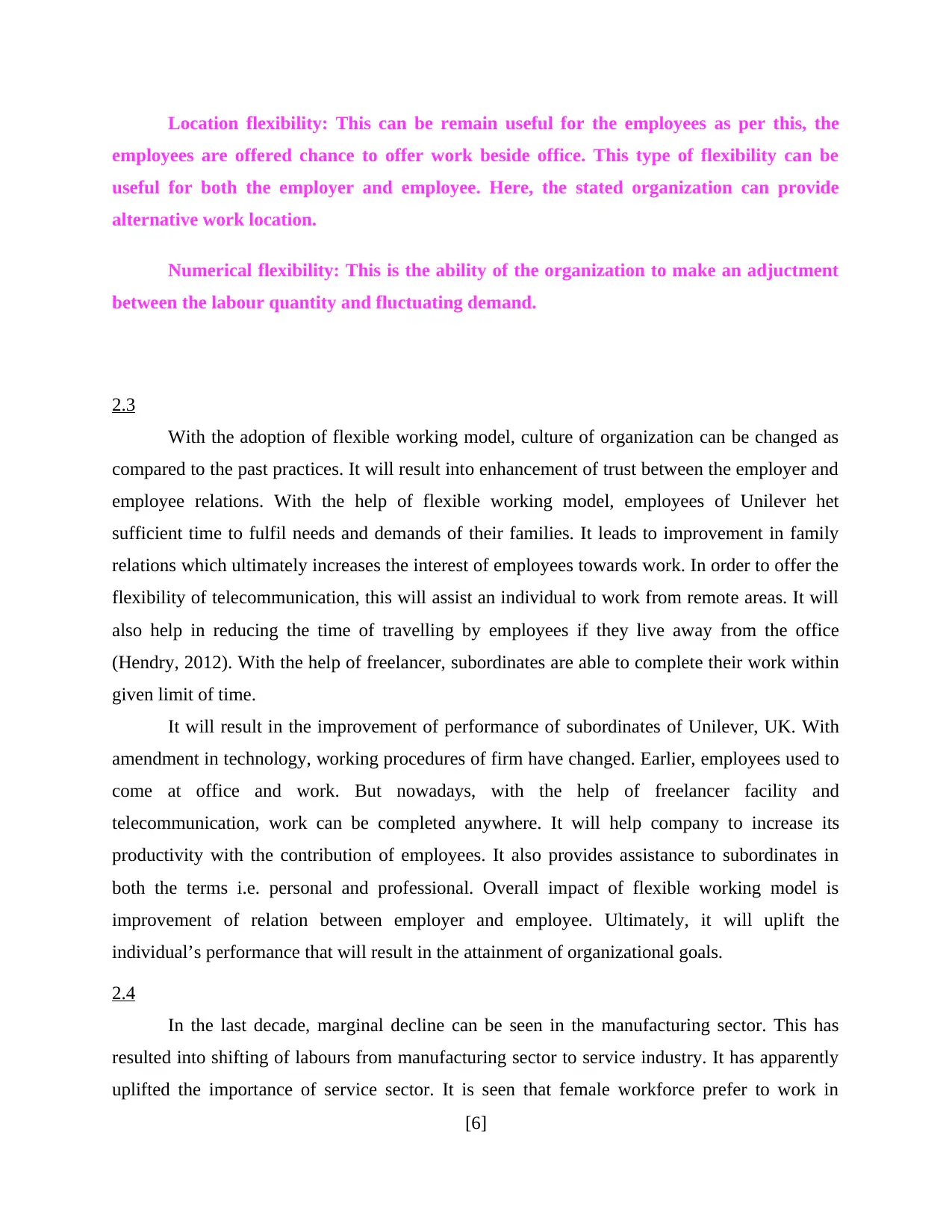
Location flexibility: This can be remain useful for the employees as per this, the
employees are offered chance to offer work beside office. This type of flexibility can be
useful for both the employer and employee. Here, the stated organization can provide
alternative work location.
Numerical flexibility: This is the ability of the organization to make an adjuctment
between the labour quantity and fluctuating demand.
2.3
With the adoption of flexible working model, culture of organization can be changed as
compared to the past practices. It will result into enhancement of trust between the employer and
employee relations. With the help of flexible working model, employees of Unilever het
sufficient time to fulfil needs and demands of their families. It leads to improvement in family
relations which ultimately increases the interest of employees towards work. In order to offer the
flexibility of telecommunication, this will assist an individual to work from remote areas. It will
also help in reducing the time of travelling by employees if they live away from the office
(Hendry, 2012). With the help of freelancer, subordinates are able to complete their work within
given limit of time.
It will result in the improvement of performance of subordinates of Unilever, UK. With
amendment in technology, working procedures of firm have changed. Earlier, employees used to
come at office and work. But nowadays, with the help of freelancer facility and
telecommunication, work can be completed anywhere. It will help company to increase its
productivity with the contribution of employees. It also provides assistance to subordinates in
both the terms i.e. personal and professional. Overall impact of flexible working model is
improvement of relation between employer and employee. Ultimately, it will uplift the
individual’s performance that will result in the attainment of organizational goals.
2.4
In the last decade, marginal decline can be seen in the manufacturing sector. This has
resulted into shifting of labours from manufacturing sector to service industry. It has apparently
uplifted the importance of service sector. It is seen that female workforce prefer to work in
[6]
employees are offered chance to offer work beside office. This type of flexibility can be
useful for both the employer and employee. Here, the stated organization can provide
alternative work location.
Numerical flexibility: This is the ability of the organization to make an adjuctment
between the labour quantity and fluctuating demand.
2.3
With the adoption of flexible working model, culture of organization can be changed as
compared to the past practices. It will result into enhancement of trust between the employer and
employee relations. With the help of flexible working model, employees of Unilever het
sufficient time to fulfil needs and demands of their families. It leads to improvement in family
relations which ultimately increases the interest of employees towards work. In order to offer the
flexibility of telecommunication, this will assist an individual to work from remote areas. It will
also help in reducing the time of travelling by employees if they live away from the office
(Hendry, 2012). With the help of freelancer, subordinates are able to complete their work within
given limit of time.
It will result in the improvement of performance of subordinates of Unilever, UK. With
amendment in technology, working procedures of firm have changed. Earlier, employees used to
come at office and work. But nowadays, with the help of freelancer facility and
telecommunication, work can be completed anywhere. It will help company to increase its
productivity with the contribution of employees. It also provides assistance to subordinates in
both the terms i.e. personal and professional. Overall impact of flexible working model is
improvement of relation between employer and employee. Ultimately, it will uplift the
individual’s performance that will result in the attainment of organizational goals.
2.4
In the last decade, marginal decline can be seen in the manufacturing sector. This has
resulted into shifting of labours from manufacturing sector to service industry. It has apparently
uplifted the importance of service sector. It is seen that female workforce prefer to work in
[6]
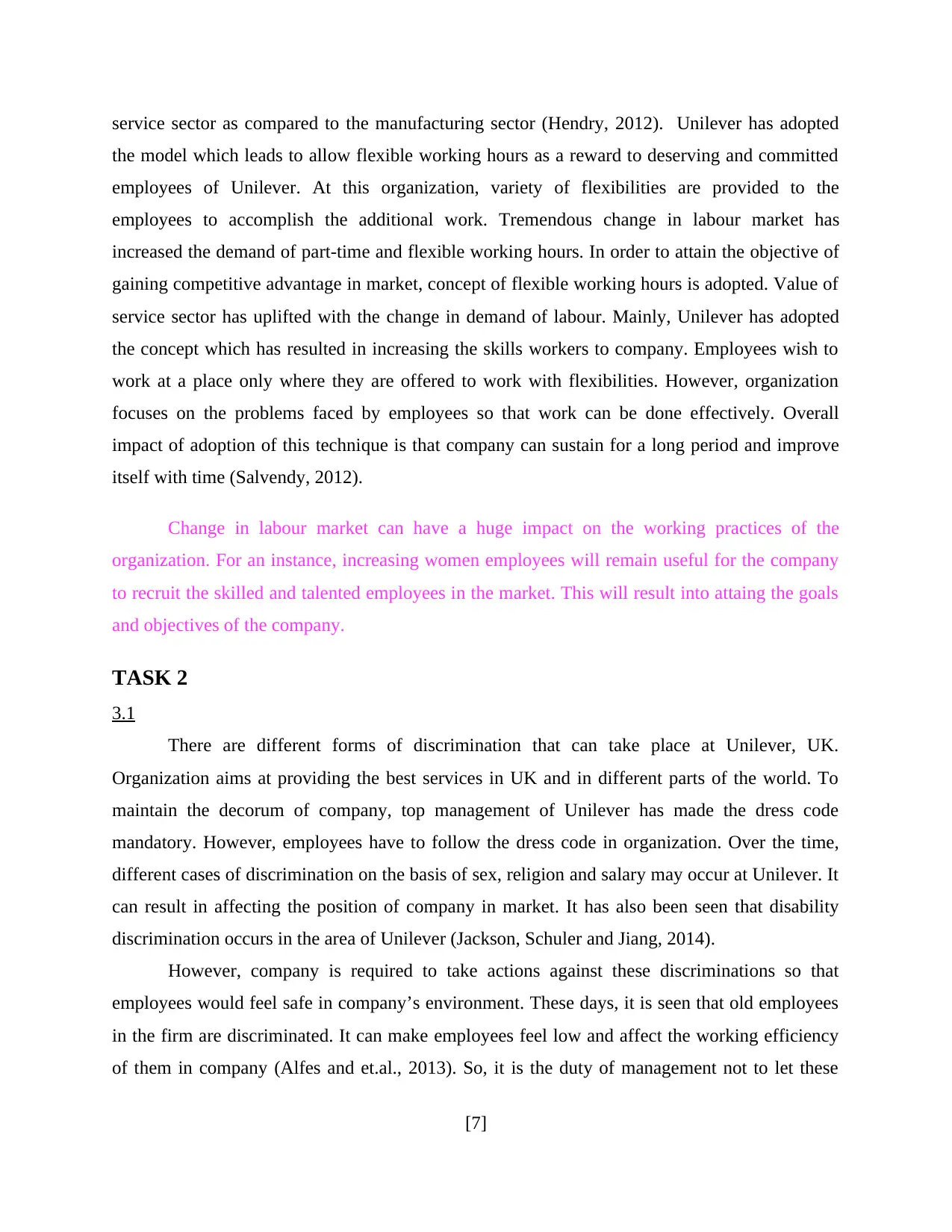
service sector as compared to the manufacturing sector (Hendry, 2012). Unilever has adopted
the model which leads to allow flexible working hours as a reward to deserving and committed
employees of Unilever. At this organization, variety of flexibilities are provided to the
employees to accomplish the additional work. Tremendous change in labour market has
increased the demand of part-time and flexible working hours. In order to attain the objective of
gaining competitive advantage in market, concept of flexible working hours is adopted. Value of
service sector has uplifted with the change in demand of labour. Mainly, Unilever has adopted
the concept which has resulted in increasing the skills workers to company. Employees wish to
work at a place only where they are offered to work with flexibilities. However, organization
focuses on the problems faced by employees so that work can be done effectively. Overall
impact of adoption of this technique is that company can sustain for a long period and improve
itself with time (Salvendy, 2012).
Change in labour market can have a huge impact on the working practices of the
organization. For an instance, increasing women employees will remain useful for the company
to recruit the skilled and talented employees in the market. This will result into attaing the goals
and objectives of the company.
TASK 2
3.1
There are different forms of discrimination that can take place at Unilever, UK.
Organization aims at providing the best services in UK and in different parts of the world. To
maintain the decorum of company, top management of Unilever has made the dress code
mandatory. However, employees have to follow the dress code in organization. Over the time,
different cases of discrimination on the basis of sex, religion and salary may occur at Unilever. It
can result in affecting the position of company in market. It has also been seen that disability
discrimination occurs in the area of Unilever (Jackson, Schuler and Jiang, 2014).
However, company is required to take actions against these discriminations so that
employees would feel safe in company’s environment. These days, it is seen that old employees
in the firm are discriminated. It can make employees feel low and affect the working efficiency
of them in company (Alfes and et.al., 2013). So, it is the duty of management not to let these
[7]
the model which leads to allow flexible working hours as a reward to deserving and committed
employees of Unilever. At this organization, variety of flexibilities are provided to the
employees to accomplish the additional work. Tremendous change in labour market has
increased the demand of part-time and flexible working hours. In order to attain the objective of
gaining competitive advantage in market, concept of flexible working hours is adopted. Value of
service sector has uplifted with the change in demand of labour. Mainly, Unilever has adopted
the concept which has resulted in increasing the skills workers to company. Employees wish to
work at a place only where they are offered to work with flexibilities. However, organization
focuses on the problems faced by employees so that work can be done effectively. Overall
impact of adoption of this technique is that company can sustain for a long period and improve
itself with time (Salvendy, 2012).
Change in labour market can have a huge impact on the working practices of the
organization. For an instance, increasing women employees will remain useful for the company
to recruit the skilled and talented employees in the market. This will result into attaing the goals
and objectives of the company.
TASK 2
3.1
There are different forms of discrimination that can take place at Unilever, UK.
Organization aims at providing the best services in UK and in different parts of the world. To
maintain the decorum of company, top management of Unilever has made the dress code
mandatory. However, employees have to follow the dress code in organization. Over the time,
different cases of discrimination on the basis of sex, religion and salary may occur at Unilever. It
can result in affecting the position of company in market. It has also been seen that disability
discrimination occurs in the area of Unilever (Jackson, Schuler and Jiang, 2014).
However, company is required to take actions against these discriminations so that
employees would feel safe in company’s environment. These days, it is seen that old employees
in the firm are discriminated. It can make employees feel low and affect the working efficiency
of them in company (Alfes and et.al., 2013). So, it is the duty of management not to let these
[7]
⊘ This is a preview!⊘
Do you want full access?
Subscribe today to unlock all pages.

Trusted by 1+ million students worldwide
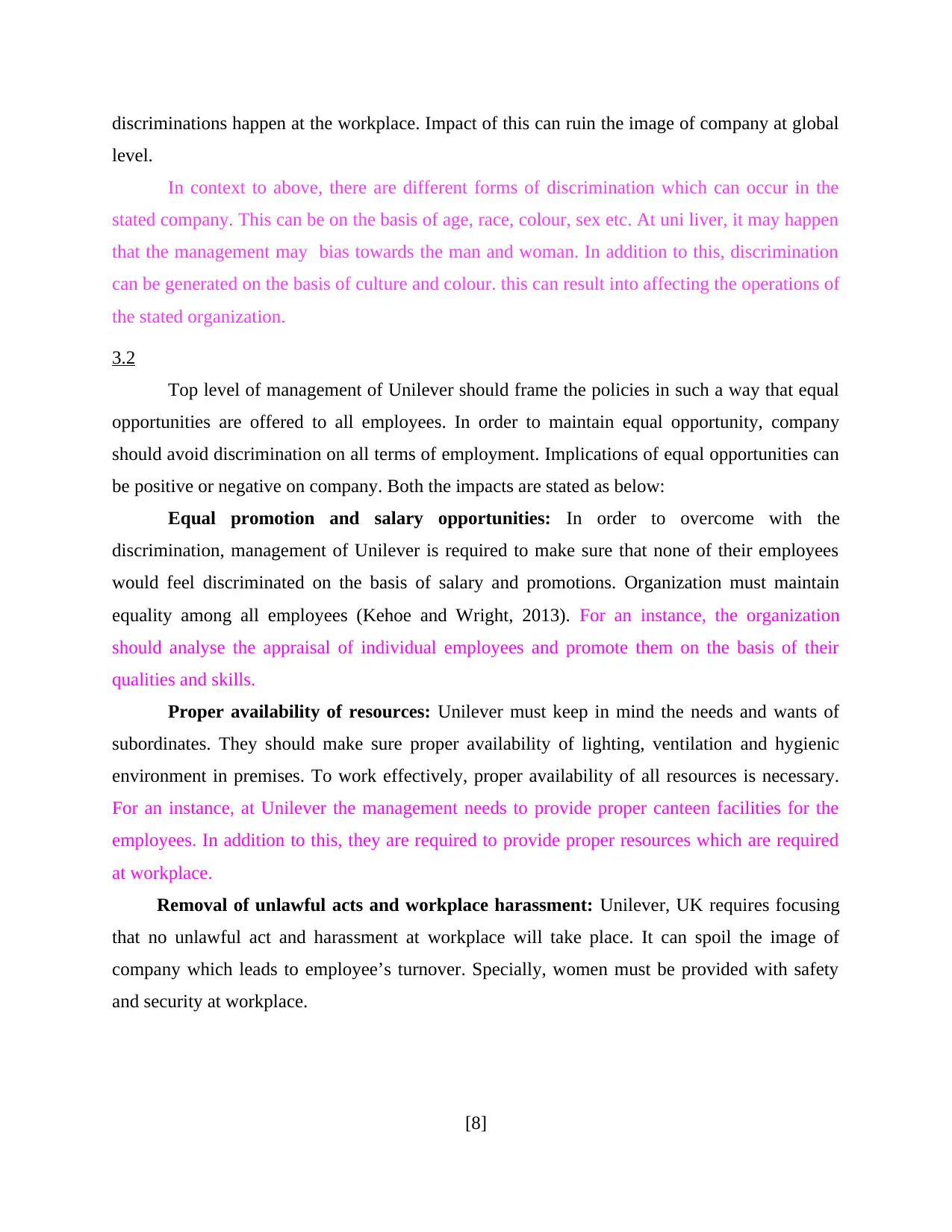
discriminations happen at the workplace. Impact of this can ruin the image of company at global
level.
In context to above, there are different forms of discrimination which can occur in the
stated company. This can be on the basis of age, race, colour, sex etc. At uni liver, it may happen
that the management may bias towards the man and woman. In addition to this, discrimination
can be generated on the basis of culture and colour. this can result into affecting the operations of
the stated organization.
3.2
Top level of management of Unilever should frame the policies in such a way that equal
opportunities are offered to all employees. In order to maintain equal opportunity, company
should avoid discrimination on all terms of employment. Implications of equal opportunities can
be positive or negative on company. Both the impacts are stated as below:
Equal promotion and salary opportunities: In order to overcome with the
discrimination, management of Unilever is required to make sure that none of their employees
would feel discriminated on the basis of salary and promotions. Organization must maintain
equality among all employees (Kehoe and Wright, 2013). For an instance, the organization
should analyse the appraisal of individual employees and promote them on the basis of their
qualities and skills.
Proper availability of resources: Unilever must keep in mind the needs and wants of
subordinates. They should make sure proper availability of lighting, ventilation and hygienic
environment in premises. To work effectively, proper availability of all resources is necessary.
For an instance, at Unilever the management needs to provide proper canteen facilities for the
employees. In addition to this, they are required to provide proper resources which are required
at workplace.
Removal of unlawful acts and workplace harassment: Unilever, UK requires focusing
that no unlawful act and harassment at workplace will take place. It can spoil the image of
company which leads to employee’s turnover. Specially, women must be provided with safety
and security at workplace.
[8]
level.
In context to above, there are different forms of discrimination which can occur in the
stated company. This can be on the basis of age, race, colour, sex etc. At uni liver, it may happen
that the management may bias towards the man and woman. In addition to this, discrimination
can be generated on the basis of culture and colour. this can result into affecting the operations of
the stated organization.
3.2
Top level of management of Unilever should frame the policies in such a way that equal
opportunities are offered to all employees. In order to maintain equal opportunity, company
should avoid discrimination on all terms of employment. Implications of equal opportunities can
be positive or negative on company. Both the impacts are stated as below:
Equal promotion and salary opportunities: In order to overcome with the
discrimination, management of Unilever is required to make sure that none of their employees
would feel discriminated on the basis of salary and promotions. Organization must maintain
equality among all employees (Kehoe and Wright, 2013). For an instance, the organization
should analyse the appraisal of individual employees and promote them on the basis of their
qualities and skills.
Proper availability of resources: Unilever must keep in mind the needs and wants of
subordinates. They should make sure proper availability of lighting, ventilation and hygienic
environment in premises. To work effectively, proper availability of all resources is necessary.
For an instance, at Unilever the management needs to provide proper canteen facilities for the
employees. In addition to this, they are required to provide proper resources which are required
at workplace.
Removal of unlawful acts and workplace harassment: Unilever, UK requires focusing
that no unlawful act and harassment at workplace will take place. It can spoil the image of
company which leads to employee’s turnover. Specially, women must be provided with safety
and security at workplace.
[8]
Paraphrase This Document
Need a fresh take? Get an instant paraphrase of this document with our AI Paraphraser
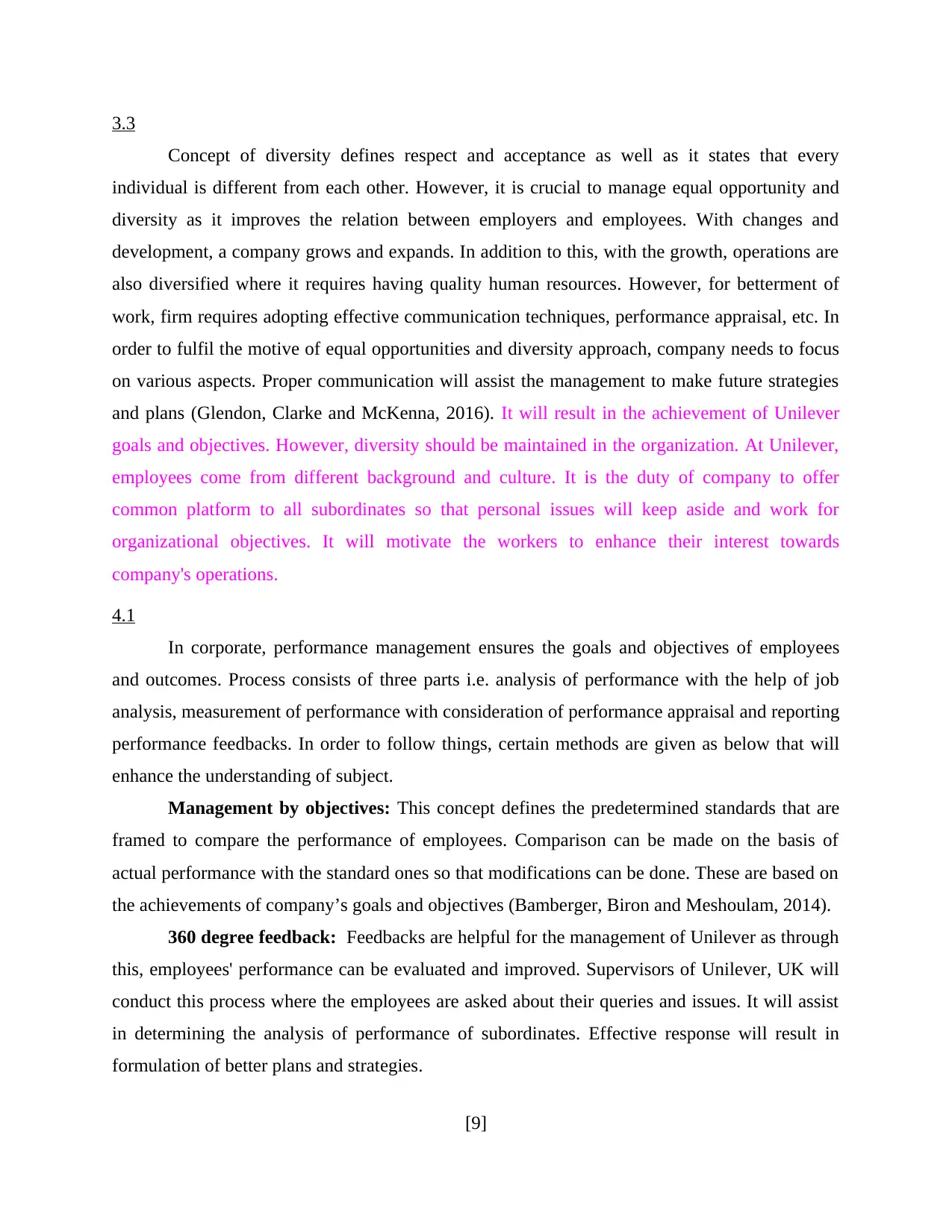
3.3
Concept of diversity defines respect and acceptance as well as it states that every
individual is different from each other. However, it is crucial to manage equal opportunity and
diversity as it improves the relation between employers and employees. With changes and
development, a company grows and expands. In addition to this, with the growth, operations are
also diversified where it requires having quality human resources. However, for betterment of
work, firm requires adopting effective communication techniques, performance appraisal, etc. In
order to fulfil the motive of equal opportunities and diversity approach, company needs to focus
on various aspects. Proper communication will assist the management to make future strategies
and plans (Glendon, Clarke and McKenna, 2016). It will result in the achievement of Unilever
goals and objectives. However, diversity should be maintained in the organization. At Unilever,
employees come from different background and culture. It is the duty of company to offer
common platform to all subordinates so that personal issues will keep aside and work for
organizational objectives. It will motivate the workers to enhance their interest towards
company's operations.
4.1
In corporate, performance management ensures the goals and objectives of employees
and outcomes. Process consists of three parts i.e. analysis of performance with the help of job
analysis, measurement of performance with consideration of performance appraisal and reporting
performance feedbacks. In order to follow things, certain methods are given as below that will
enhance the understanding of subject.
Management by objectives: This concept defines the predetermined standards that are
framed to compare the performance of employees. Comparison can be made on the basis of
actual performance with the standard ones so that modifications can be done. These are based on
the achievements of company’s goals and objectives (Bamberger, Biron and Meshoulam, 2014).
360 degree feedback: Feedbacks are helpful for the management of Unilever as through
this, employees' performance can be evaluated and improved. Supervisors of Unilever, UK will
conduct this process where the employees are asked about their queries and issues. It will assist
in determining the analysis of performance of subordinates. Effective response will result in
formulation of better plans and strategies.
[9]
Concept of diversity defines respect and acceptance as well as it states that every
individual is different from each other. However, it is crucial to manage equal opportunity and
diversity as it improves the relation between employers and employees. With changes and
development, a company grows and expands. In addition to this, with the growth, operations are
also diversified where it requires having quality human resources. However, for betterment of
work, firm requires adopting effective communication techniques, performance appraisal, etc. In
order to fulfil the motive of equal opportunities and diversity approach, company needs to focus
on various aspects. Proper communication will assist the management to make future strategies
and plans (Glendon, Clarke and McKenna, 2016). It will result in the achievement of Unilever
goals and objectives. However, diversity should be maintained in the organization. At Unilever,
employees come from different background and culture. It is the duty of company to offer
common platform to all subordinates so that personal issues will keep aside and work for
organizational objectives. It will motivate the workers to enhance their interest towards
company's operations.
4.1
In corporate, performance management ensures the goals and objectives of employees
and outcomes. Process consists of three parts i.e. analysis of performance with the help of job
analysis, measurement of performance with consideration of performance appraisal and reporting
performance feedbacks. In order to follow things, certain methods are given as below that will
enhance the understanding of subject.
Management by objectives: This concept defines the predetermined standards that are
framed to compare the performance of employees. Comparison can be made on the basis of
actual performance with the standard ones so that modifications can be done. These are based on
the achievements of company’s goals and objectives (Bamberger, Biron and Meshoulam, 2014).
360 degree feedback: Feedbacks are helpful for the management of Unilever as through
this, employees' performance can be evaluated and improved. Supervisors of Unilever, UK will
conduct this process where the employees are asked about their queries and issues. It will assist
in determining the analysis of performance of subordinates. Effective response will result in
formulation of better plans and strategies.
[9]
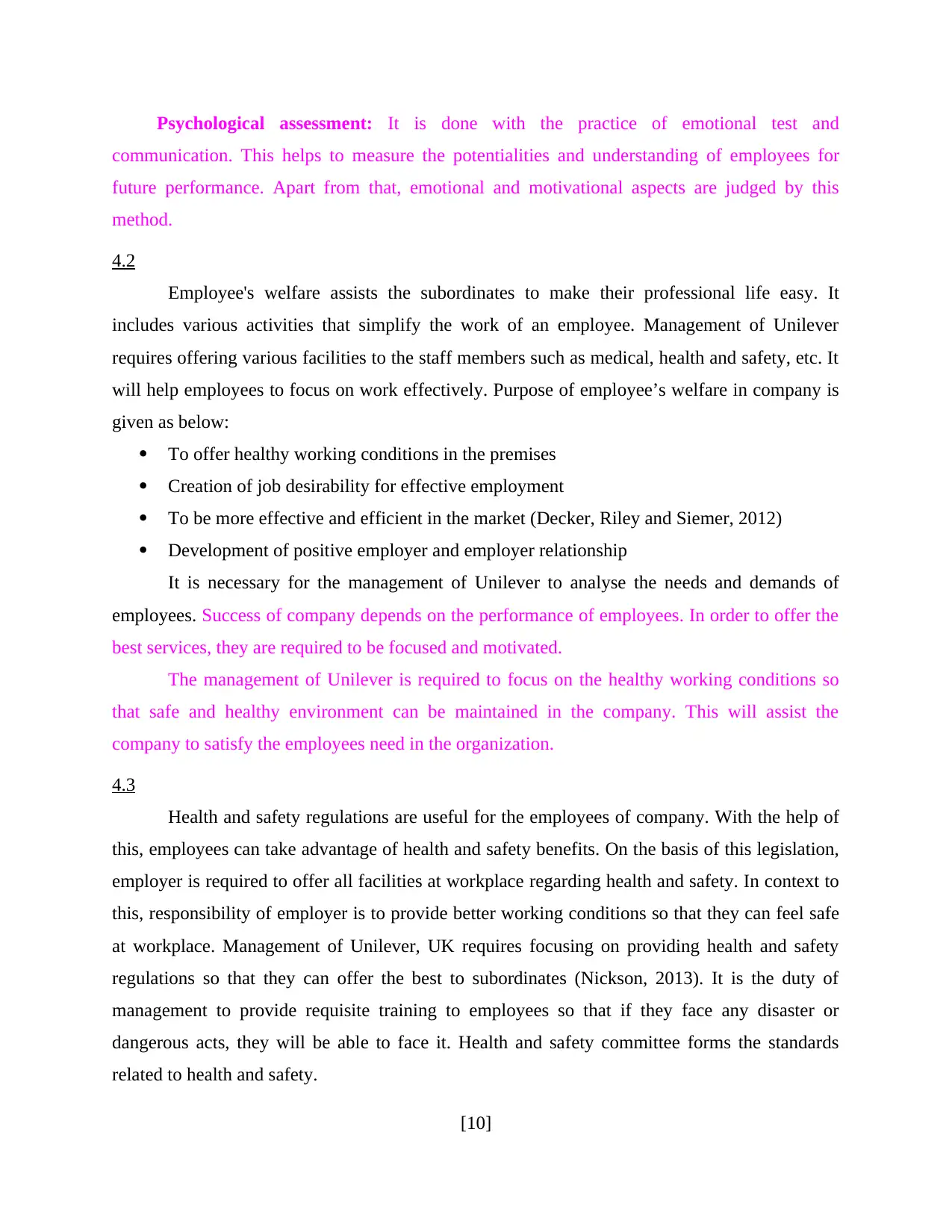
Psychological assessment: It is done with the practice of emotional test and
communication. This helps to measure the potentialities and understanding of employees for
future performance. Apart from that, emotional and motivational aspects are judged by this
method.
4.2
Employee's welfare assists the subordinates to make their professional life easy. It
includes various activities that simplify the work of an employee. Management of Unilever
requires offering various facilities to the staff members such as medical, health and safety, etc. It
will help employees to focus on work effectively. Purpose of employee’s welfare in company is
given as below:
To offer healthy working conditions in the premises
Creation of job desirability for effective employment
To be more effective and efficient in the market (Decker, Riley and Siemer, 2012)
Development of positive employer and employer relationship
It is necessary for the management of Unilever to analyse the needs and demands of
employees. Success of company depends on the performance of employees. In order to offer the
best services, they are required to be focused and motivated.
The management of Unilever is required to focus on the healthy working conditions so
that safe and healthy environment can be maintained in the company. This will assist the
company to satisfy the employees need in the organization.
4.3
Health and safety regulations are useful for the employees of company. With the help of
this, employees can take advantage of health and safety benefits. On the basis of this legislation,
employer is required to offer all facilities at workplace regarding health and safety. In context to
this, responsibility of employer is to provide better working conditions so that they can feel safe
at workplace. Management of Unilever, UK requires focusing on providing health and safety
regulations so that they can offer the best to subordinates (Nickson, 2013). It is the duty of
management to provide requisite training to employees so that if they face any disaster or
dangerous acts, they will be able to face it. Health and safety committee forms the standards
related to health and safety.
[10]
communication. This helps to measure the potentialities and understanding of employees for
future performance. Apart from that, emotional and motivational aspects are judged by this
method.
4.2
Employee's welfare assists the subordinates to make their professional life easy. It
includes various activities that simplify the work of an employee. Management of Unilever
requires offering various facilities to the staff members such as medical, health and safety, etc. It
will help employees to focus on work effectively. Purpose of employee’s welfare in company is
given as below:
To offer healthy working conditions in the premises
Creation of job desirability for effective employment
To be more effective and efficient in the market (Decker, Riley and Siemer, 2012)
Development of positive employer and employer relationship
It is necessary for the management of Unilever to analyse the needs and demands of
employees. Success of company depends on the performance of employees. In order to offer the
best services, they are required to be focused and motivated.
The management of Unilever is required to focus on the healthy working conditions so
that safe and healthy environment can be maintained in the company. This will assist the
company to satisfy the employees need in the organization.
4.3
Health and safety regulations are useful for the employees of company. With the help of
this, employees can take advantage of health and safety benefits. On the basis of this legislation,
employer is required to offer all facilities at workplace regarding health and safety. In context to
this, responsibility of employer is to provide better working conditions so that they can feel safe
at workplace. Management of Unilever, UK requires focusing on providing health and safety
regulations so that they can offer the best to subordinates (Nickson, 2013). It is the duty of
management to provide requisite training to employees so that if they face any disaster or
dangerous acts, they will be able to face it. Health and safety committee forms the standards
related to health and safety.
[10]
⊘ This is a preview!⊘
Do you want full access?
Subscribe today to unlock all pages.

Trusted by 1+ million students worldwide
1 out of 16
Related Documents
Your All-in-One AI-Powered Toolkit for Academic Success.
+13062052269
info@desklib.com
Available 24*7 on WhatsApp / Email
![[object Object]](/_next/static/media/star-bottom.7253800d.svg)
Unlock your academic potential
Copyright © 2020–2026 A2Z Services. All Rights Reserved. Developed and managed by ZUCOL.





